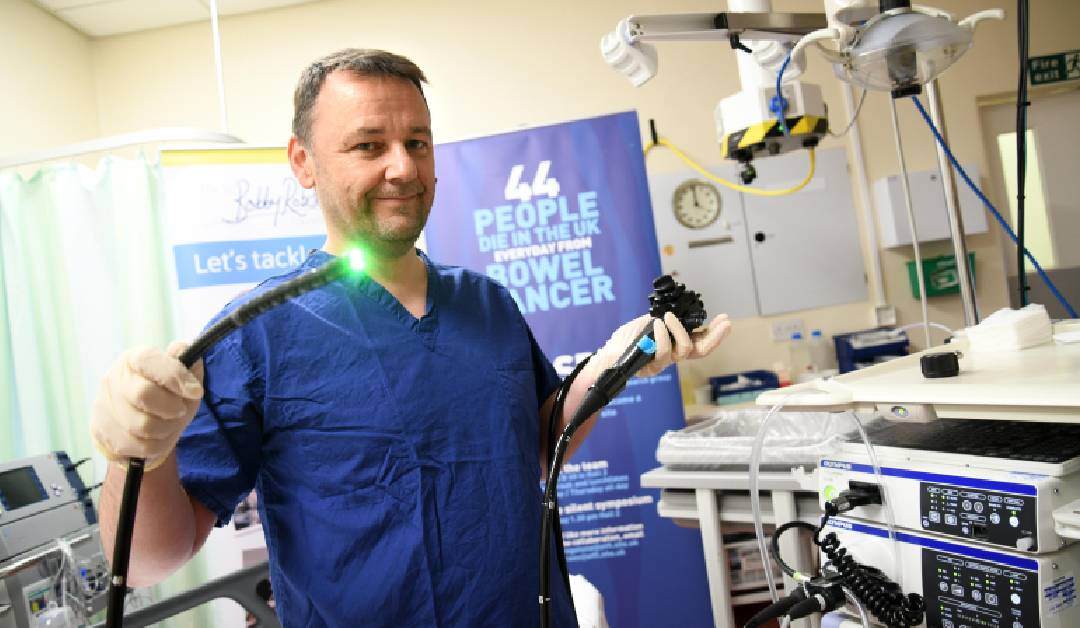AI tool can detect early signs of bowel cancer
17 September 2024 | By: Newcastle University | 2 min read
Bowel cancer is the second biggest killer cancer after lung cancer and claims around 16,800 lives a year, or 46 each day, in the UK. Bowel cancer is treatable and curable if detected early.
Find out how Newcastle University led a successful trial using artificial intelligence (AI) in colonoscopies to spot abnormalities that could potentially lead to bowel cancer.
Contents:
Early detection
At its earliest stage, bowel cancer can be hard to spot.
Many bowel cancers happen when a polyp on the lining of the bowel becomes malignant and cancer subsequently develops. To prevent or diagnose the condition, also known as colorectal cancer, a colonoscopy is carried out by experts.
Colonoscopies are a procedure where a camera is used to look inside the bowel, with the aim of detecting cancerous and premalignant polyps (adenomas) within the large bowel.
The ’miss rate’ for all polyps during colonoscopy is around 26%, with small flat polyps (specifically a more worrying form of polyps called sessile serrated lesions) being more likely to be missed. Polyps can be undetected due to several reasons, including:
• incomplete visualisation
• failure to detect polyps within the visual field
Could AI help clinicians spot more bowel cancer cases?
Recently, a trial - led by Professor of Gastroenterology at Newcastle University Professor Colin Rees – looked to answer that exact question. It put AI to the test to determine how efficiently it could find premalignant polyps, to help save lives.

Professor Rees is the President of the British Society of Gastroenterology (BSG). Photo: South Tyneside and Sunderland NHS Foundation Trust
About the trial
COLO-DETECT is the largest trial of its kind in the world.
The trial used GI Genius™ AI device, a computer module powered by AI. Created by Medtronic, the intelligent endoscopy module for polyp detection is added to the existing technology used during a colonoscopy.
To assess the clinical effectiveness of this AI tool, the GI Genius was compared with standard colonoscopy in routine practice. In this randomised controlled trial, half of the participants had the colonoscopy procedure using AI, and the other half having a ‘traditional’ colonoscopy.
When the technology spots a possible polyp it puts a box around the polyp on the image of the colon on the screen and the clinician then decides whether to remove the polyp.
Newcastle University, South Tyneside and Sunderland NHS Foundation Trust, led the study, with 2,032 participants taking part, from 10 centres across the country – including four based in the North East.
Saving lives
The results of the trial show that the AI tool had a greater efficiency at detecting the polyps that could potentially become cancerous.
Professor Rees said: “Crucially, we know that some of the polyps that lead to cancer are small polyps or flat polyps. The AI helped us find more of these lesions, it is finding the things we are concerned about as well as spotting things that we can miss with the human eye.”
There are around 43,000 new cases of bowel cancer in the UK each year, and Professor Rees hopes this technology will now be adopted more widely to detect early signs of the disease.
Professor Rees said: “This trial has demonstrated that using artificial intelligence can significantly increase detection of the kinds of abnormalities in the bowel that may progress to cancer. It allows us to find these lesions, remove them, and stop them from turning into cancer.
“We are delighted with the outcome of this trial. Simply put, it will save lives.”
Professor Rees added: “It is a tragedy because bowel cancer is a disease that people shouldn't be dying from. We have a long window of time when these polyps develop, probably about 10 to 15 years from developing to the point they become cancer.
“We are now using this technology routinely in our practice, and I really hope that it will be used more extensively, and the fantastic thing about AI is that it learns. It is trained by looking at images, using the data to find the differences between the images, and it is adding to its knowledge all the time, so it’s only going to get better.”
The trial has shown that AI can now play a more prominent role in bowel cancer detection.
The Trust will continue to make the equipment available to its teams based at Endoscopy units at South Tyneside District Hospital and Sunderland Royal Hospital.
You might also like
- read the research: Seager, Alexander Cripps, Neil et al. The Lancet Gastroenterology & Hepatology, Volume 9, Issue 10, 911 - 923 DOI: 10.1016/S2468-1253(24)00161-4
- read our news story about the trial results
- find out about recruiting the final patient for the trial
- more information about COLO-DETECT
- learn about our work in ageing and health
- COLO-SPEED is backed by the Sir Bobby Robson Foundation, which is part the Newcastle Upon Tyne Hospitals NHS Foundation Trust Charity and gifted £985,000 to help set up a platform which used to support all the COLO group of studies.
